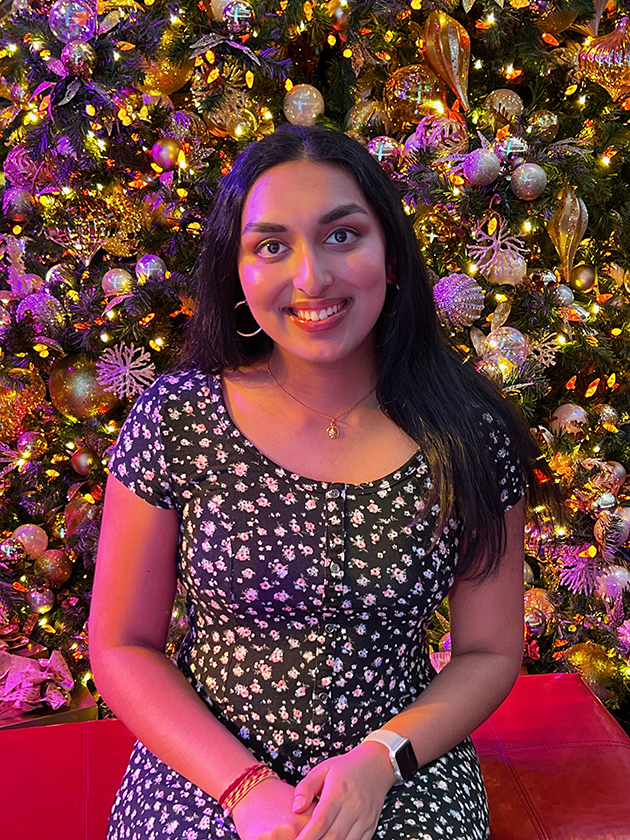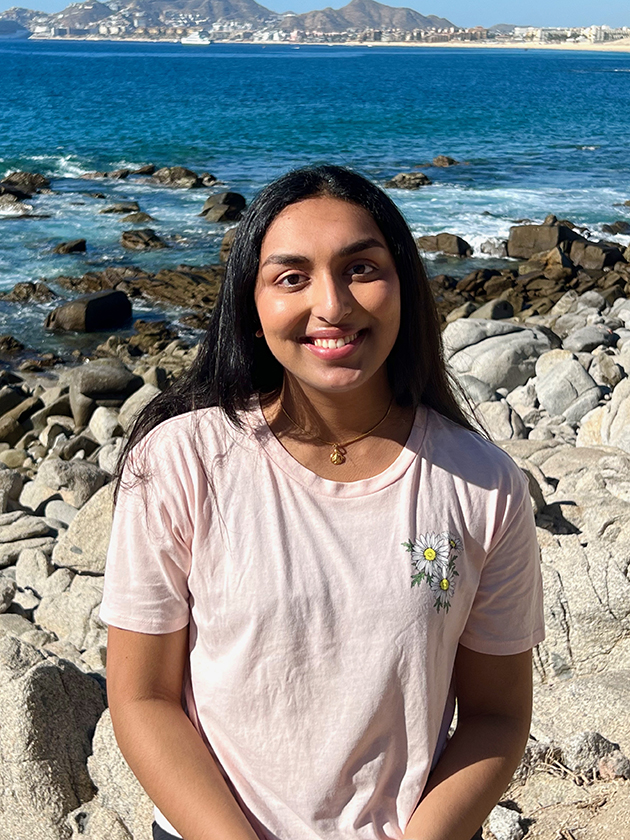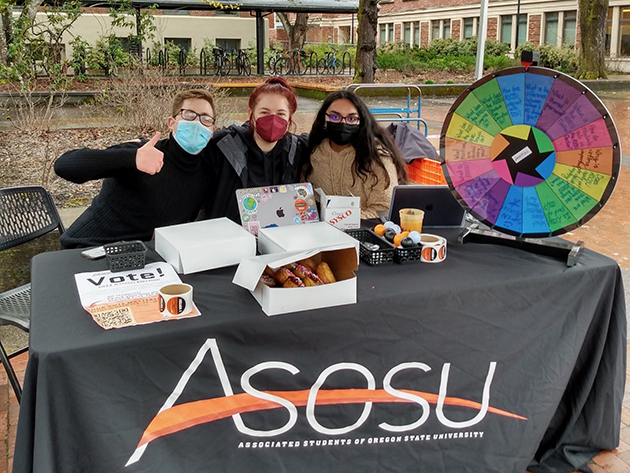The Oregon State University Honors College attracts a wide variety of students, from aspiring engineers and chemists to poets and musicians. But they all have one thing in common: a drive to make a difference in the world. Maya Sonpatki, a third-year Honors College student, strives for equity in the healthcare system and plans to use her biohealth sciences and Spanish majors to realize this ambition.
An Early Start
Growing up, Maya’s personal experiences with healthcare led her to realize the obstacles many people face in trying to access care and treatment. Coming from an immigrant family, she watched how healthcare providers treated grandparents and family members and saw how communication barriers often led to inferior services. “From a young age, constantly being exposed to that disparity really struck me,” Maya says. “It played a big part in my passion for advocating for equity in healthcare.”
This awareness of the importance of communication led to her decision to enroll in an international school when she was 11 years old, where she first started learning Spanish. At Oregon State, Maya has continued pursuing interests in language, as well as in science. “I felt like biohealth sciences and Spanish both connect to the passions I have for communication and healthcare. I want to enable people to receive equitable care by helping them communicate with their providers in ways that members of my family couldn’t.”

Breaking Down Barriers
Maya has taken her dedication to healthcare equity out of the classroom, as well. She currently volunteers with Community Outreach Inc. as a Spanish translator. Her work has not only helped her build her Spanish skills, but it also allows Maya to assist community members in need. “It’s been really rewarding working with the doctors and nurses to help patients in real time, to see the impact I’m able to have in connecting people with care that they wouldn’t otherwise be able to access at that level,” Maya says.
Maya also volunteered her multilingual talents the past two summers at Portland’s Virginia Garcia Memorial Health Center. “The entire purpose of that organization is to provide culturally competent and equitable healthcare for people who do not speak English as their first language,” she says. Her first summer coincided with the beginning of the COVID-19 pandemic, so Maya spent most of her time at vaccination clinics, providing information to primarily Spanish-speaking patients. This past summer, Maya worked as Virginia Garcia’s assistant outreach coordinator, helping with the health center’s mobile clinic, which serviced migrant camps and provided healthcare to seasonal farmworkers and their families.

Maya is currently interning at Franklin Public School in Corvallis, as well. Through the university’s Spanish department, she runs an after-school Spanish program for elementary and middle school students who want to expand their Spanish skills, creating curriculum and facilitating classes with other interns. She enjoys the opportunity to share her love of languages with young learners, saying, “Being multilingual is so vital because it allows you to communicate with different people in different situations. Being able to ignite that excitement and start these students on their language learning journeys has been amazing, and I’m very grateful for the opportunity.”
Maya’s advocacy efforts are visible on Oregon State’s campus too. Last year, she served as the accessibility and wellness coordinator for the executive branch of the Associated Students of Oregon State University. “After spending my first year at home during the pandemic, I saw ASOSU as a way to ensure students have equitable access to the services and resources on campus,” she says. Maya was heavily involved in campaigns such as the implementation of the Menstrual Dignity Act, which requires all Oregon public school buildings to provide free menstrual products for students. “The university was taking steps towards providing menstrual products for all, but not at the rate or to the level that students really needed,” Maya says. She met with university administrators to ensure that the university was on track to provide menstrual dispensers in all restrooms on campus. Maya’s work also extends to the Sexual Advocacy Resource Center, where she advocated to expand support to survivors of interpersonal violence. Along with other members of the ASOSU executive branch, she led the survivor care reform task force, which helped the organization increase staffing and offer centralized survivor care services. Currently, Maya is serving as the head of the judicial branch of ASOSU, working behind the scenes to ensure that all the pieces of ASOSU function efficiently.

Proteins and Possibilities
In addition to her advocacy, Maya works in Professor Elisar Barbar’s lab in the Department of Biochemistry and Biophysics researching 53BP1, a protein involved in tumor suppression. “53BP1 is associated with poor prognosis of different cancers as well as resistance to certain chemotherapy agents and radiation, so this research has really interesting applications.” Her current research is attempting to achieve a biophysical characterization of the interactions between 53BP1 and hub protein LC8 to better understand the structure and function of the protein complexes.
Maya is dedicated to helping her community, with her research, volunteer work and aspirations for the future of healthcare, and she credits the Honors College with helping her create her own path and discover new opportunities. “I’ve been inspired by the Honors College and its interdisciplinary approach to education,” Maya says. “I’m very grateful for the people I’ve met, the opportunities I’ve been able to pursue and the community that I’ve found over the past three years through the Honors College.”
By Rhianne Barratt, student writer
CATEGORIES: All Stories HC Student Spotlights Homestories Students